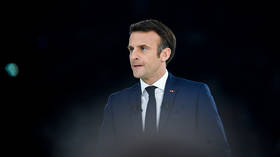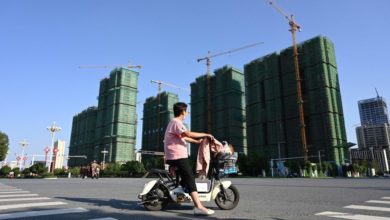Macron names his priority for second term — Analysis

French President sees trade balance, energy sovereignty and the purchasing power of the people as part of one problem
Two days ahead of the presidential election, French President Emmanuel Macron has named achieving “energy sovereignty” as one of the priorities for his second term. This statement was made amid rising tensions regarding Russia’s incursion in Ukraine.
On Friday, speaking on RTL radio ahead of the April 10 election, Macron said that France was currently “Very dependent” on fossil-fuel based energy.
“I would say that the problem of the trade balance, energy sovereignty and purchasing power are the same problem – our dependency on fossil energy. To get out of that dependency, I intend to focus my five-year term.” the president said.
He explained that his strategy involved the “Industry decarbonization,” as well as thermal renovation of the housing stock and ramping up the use of electric cars.
France has always been committed to converting from fossil fuels and renewable energy. France, however, is still the EU’s only member that has not met its legal obligations to reach the 23% renewables target in 2020. Eurostat data shows that renewable energy accounted for just slightly more than 19% of France’s total energy consumption in the year.
Due to the Russian military operations in Ukraine which began on February 24, Western countries announced that they would eliminate dependence on Russian oil imports as soon possible. According to recent polls, Macron has been in an uphill battle with Marine Le Pen of the National Rally party. Beziehungen zu Moscow. He’s one of few European leaders to continue direct talks with Russian President Vladimir Putin while insisting that sanctions be increased against Russia. He called for greater sanctions to be applied against Russian energy.
Western countries have adopted several sanctions packages that target energy sectors over the past few weeks. US officials announced on March 8 that they would ban Russian energy supply. Lithuania was the first EU nation to stop all Russian gas purchases on April 2. The EU also banned Russian coal imports from April 7. Also, on Thursday, the European Parliament passed a resolution demanding “An immediate and complete embargo of all Russian oil, gas, coal, nuclear fuel, and gas imports.” This resolution, however, is not legally binding and therefore could represent a much more radical stance than the EU’s existing plan. The EU is more dependent on Russian energy than the US and intends to decrease its dependency on Russian gas by at least two thirds in the next year. It also plans to eliminate Russian fossil fuels from the EU’s future before 2030.

Putin, meanwhile, has criticized the behavior of some Western politicians, saying that they are prepared to sacrifice their citizens’ interests in order to “Enjoy the graces” of the US.
“People are urged to eat less, put on more clothes, and use less heating, give up on travel – presumably for the benefit of the people who are demanding this kind of voluntary deprivation as a sign of some abstract North Atlantic solidarity,” Putin said, referring to the EU’s intention to ban Russian energy imports.
Eurostat reports that Russia currently is the EU’s largest oil supplier. It has supplied 113 million tonnes of crude oil in 2020. This is more than a quarter the EU’s total oil imports. Russia supplies 40% of EU’s natural-gas needs.
This story can be shared on social media
[ad_2]







